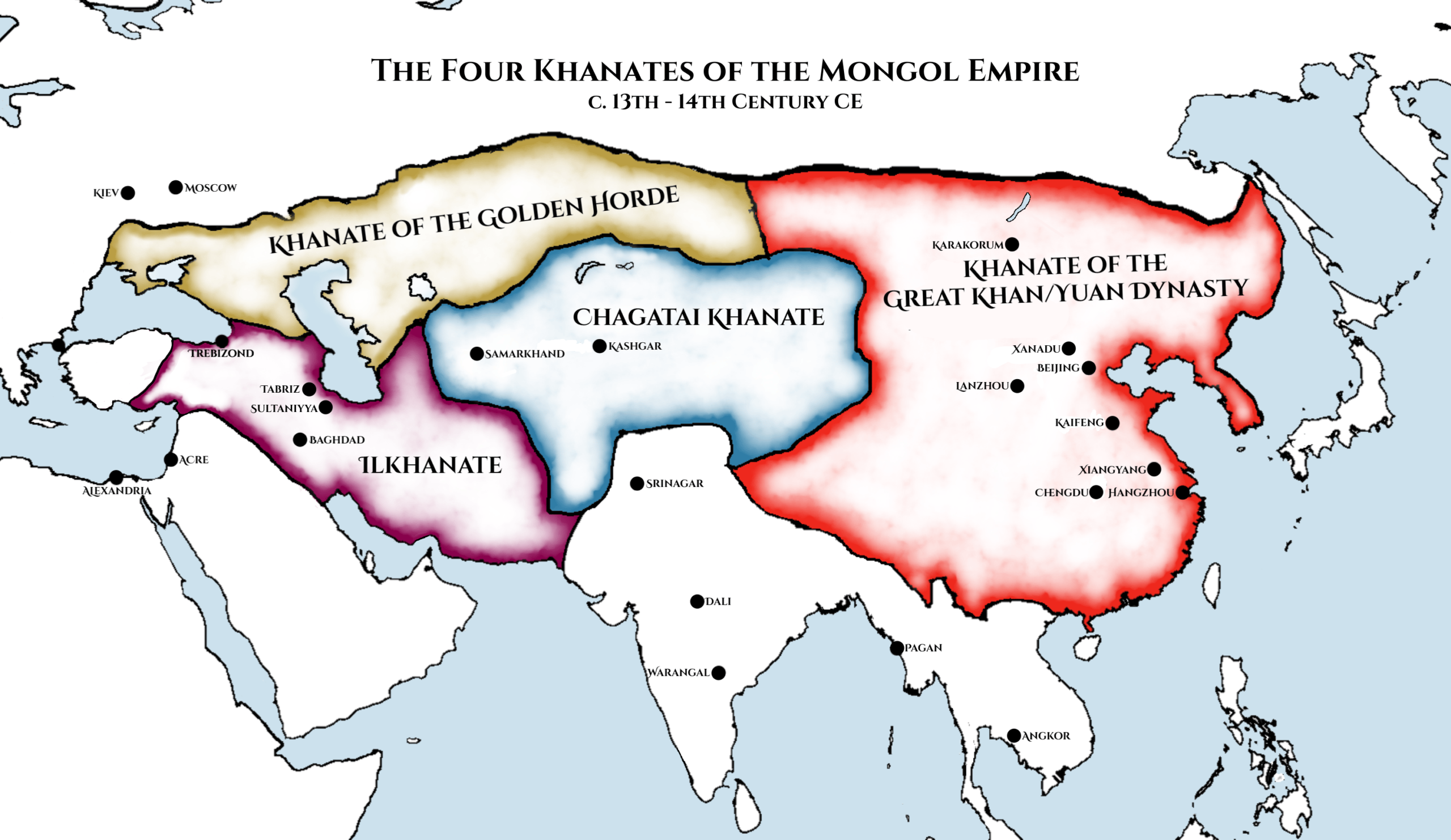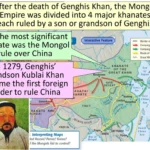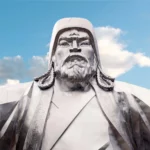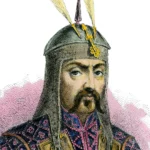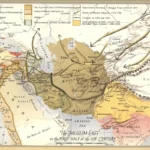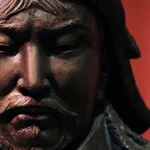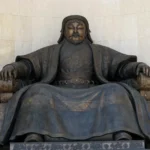Ready yourself for an epic tale of Genghis Khan and his Mongol Empire. This was no ordinary empire; it was a colossus that spanned across the Eurasian continent. We’ll explore the rise of the Mongol horde, their incredible military skills, and the far-reaching impact they had on the world. Get ready for a wild ride through the vast Mongolian steppe and into the annals of history!
Genghis Khan and the Mongol Empire: A Tale of Conquest and Legacy
Genghis Khan, a legendary figure in history, emerged from humble beginnings in the steppes of Mongolia to create one of the largest empires the world has ever known. He led his people with charisma and determination, transforming them into a mighty force that conquered vast swaths of territory.
From Shepherd Boy to Conqueror
Genghis Khan’s rise was marked by adversity. Born to a minor noble family, he faced hardship and setbacks. Yet, his leadership skills and military prowess shone through. He united the nomadic tribes of Mongolia, instilling discipline and organization amongst them.
A Master of Warfare
Genghis Khan was a brilliant military strategist. He utilized innovative tactics such as mounted archers, rapid troop movements, and advanced siege warfare. His armies were highly mobile and adaptable, enabling them to overcome diverse terrains and outmaneuver their opponents.
Conquest and Expansion
Led by Genghis Khan, the Mongol Empire embarked on a series of conquests that reshaped the geopolitical landscape. They pushed their borders eastward into China, westward into Central Asia, and eventually into Eastern Europe. At its peak, the empire spanned a staggering 13 million square kilometers.
Beyond Conquest: Empire Building
Genghis Khan was not just a conqueror but also a statesman. He implemented religious tolerance, promoted trade, and encouraged cultural exchange within his vast empire. The Mongol Empire became a hub for commerce and cultural diffusion, fostering the exchange of ideas and innovations.
A Lasting Legacy
Genghis Khan’s legacy extends far beyond his conquests. His military achievements and leadership qualities are still studied by historians and military experts. The Mongol Empire, which he founded, left an indelible mark on the world, shaping the destinies of nations for centuries to come.
If you want to learn about the history of the Mongol Empire and the Genghis Khan achievements, read this article to get all the details about his life and accomplishments. Also, if you want to know about his campaigns, then you should read Genghis Khan conquests. Also, here are some interesting Genghis Khan quotes that you should read to understand about his leadership qualities. Check out this Genghis Khan timeline which will give you an idea about the crucial events and achievements in his lifetime.
Rise to Power
In the sprawling grasslands of Central Asia, a legend was born—Genghis Khan. From humble beginnings as Temujin, he rose through the ranks, uniting tribes and forging an empire that would forever change the face of the world.
The Making of a Leader
Temujin’s path was paved with challenges and triumph. He faced treachery and rivalry, yet his unwavering determination and strategic mind carried him through. By forging alliances and winning key battles, he gradually consolidated his power and expanded his territory.
Military Prowess
The Mongol army was the epitome of power, feared for its lightning-fast cavalry, cunning siege tactics, and skilled archers. Genghis Khan’s innovative military reforms revolutionized warfare, giving his armies an unstoppable edge. They swept across vast lands, conquering territories from Central Asia to Eastern Europe and beyond.
Empire Building
Under Genghis Khan’s rule, the Mongol Empire became a colossal landmass. Its expansion was fueled by relentless campaigns of conquest, where the Mongols’ military might and organizational skills proved unbeatable. The empire’s vastness allowed for cultural exchange, religious tolerance, and economic growth.
Legacy of Dominance
Genghis Khan’s influence extended far beyond his conquests. His empire brought stability, prosperity, and the spread of knowledge. The Mongols promoted trade, facilitated the exchange of ideas, and left an enduring mark on the Eurasian Steppe and beyond.
Key Milestones in the Mongol Empire’s Rise to Power
| Milestone | Description |
|---|---|
| Unification of Mongol and Turkic Tribes | Temujin forged alliances and conquered rival tribes, consolidating his power. |
| Military Reforms | Innovations such as swift cavalry and disciplined archers gave the Mongol army an advantage. |
| Conquest of Central Asia and China | The Mongols expanded their territory, establishing a vast empire. |
| Expansion into Eastern Europe | The empire reached its furthest extent, spanning from Asia to Europe. |
| Cultural Exchange and Economic Prosperity | The empire facilitated the spread of ideas and promoted economic growth. |
Genghis Khan and the Legacy of the Mongol Empire: A Journey Through Time
Imagine stepping back in time to the vast and untamed plains of the 13th century, where Genghis Khan, a young warrior from the Mongol tribe, emerged as a formidable force. His quest to unite the nomadic tribes and establish an empire that would forever alter the course of history began.
Genghis Khan, known for his strategic brilliance and unwavering determination, led the Mongol army to unprecedented heights. Their skilled cavalry, armed with deadly arrows, could strike with astonishing speed and precision, leaving enemies quaking in their boots. But beyond their military prowess, Genghis Khan was a master politician.
He implemented a merit-based system of governance, appointing capable individuals from conquered territories to key positions. By fostering inclusivity and recognizing talent, he ensured loyalty and smooth administration across his vast empire.
Beyond conquest, the Mongol Empire became a vibrant tapestry of cultures. As they conquered far-flung lands, they absorbed diverse ideas and advancements. From the Chinese to the Persians, the Mongols learned about science, technology, and the arts, enriching their own society and leaving a lasting impact on world civilization.
Their legacy is still felt today. Genghis Khan’s leadership and military tactics have influenced modern warfare, while his diplomatic acumen continues to be studied by scholars and policymakers. The Mongol Empire’s cultural exchange fostered diversity and innovation, shaping the world we live in.
The Keys to Their Success:
- Leadership: Genghis Khan’s visionary guidance united nomadic tribes into a formidable force.
- Military Prowess: Their renowned cavalry and innovative tactics were unmatched, securing countless victories.
- Political Mastery: The merit-based governance system fostered loyalty and administrative efficiency.
- Cultural Exchange: The Mongol Empire became a melting pot of cultures, absorbing and sharing knowledge and ideas.
As we delve into the annals of history, the legacy of the Mongol Empire stands tall as a testament to the transformative power of a strong leader, a skilled army, and a commitment to inclusiveness and cultural exchange.
Political Legacy of Genghis Khan and the Mongol Empire
Uniting the Nomadic Tribes
Before Genghis Khan came along, the Mongolian steppe was like a wild west movie, with different tribes fighting and bickering like cowboys. But Genghis was a smart cookie, and he thought, “Hey, why don’t we put aside our differences and team up?” So, he did just that, forging alliances and using his army to bring them together under one roof. Talk about a Mongolian family reunion!
Merit-Based Governance
Genghis wasn’t all about nepotism. He believed in giving people a fair shot, so he set up a system where you could rise through the ranks based on how good you were at your job, not because of your family connections. Imagine if all governments worked like that!
Pax Mongolica
Under the Mongol rule, things got calmer than a baby’s breath. Trade flourished like never before, and different cultures blended together like a tasty smoothie. People could travel safely from one end of the empire to the other, sharing ideas and innovations. It was like a global party, but without the hangovers.
Legal Code
To keep the peace, Genghis created a big rulebook called the Yasa. It was like the legal equivalent of a traffic light, telling people what they could and couldn’t do. The Yasa covered everything from taxes to how to treat prisoners. It made sure that everyone knew what the deal was and kept the empire running smoothly.
Key Takeaways
- Genghis Khan united nomadic tribes, transforming the Mongolian steppe into a mighty empire.
- He implemented a system where people got jobs based on their skills, not their family history.
- The Pax Mongolica created a harmonious environment that fostered trade and cultural exchange.
- The Yasa legal code brought order and justice to the vast Mongol Empire.
Citation:
- Britannica: https://www.britannica.com/biography/Genghis-Khan/Legacy].
FAQ
Q1: What factors contributed to Genghis Khan’s success in unifying the Mongol tribes?
A1: Genghis Khan’s success in unifying the Mongol tribes can be attributed to his exceptional leadership skills, strategic brilliance, and innovative military tactics. He implemented a merit-based system of governance and a legal code to ensure justice throughout his empire.
Q2: What were the key military innovations that gave the Mongols an advantage in battle?
A2: The Mongols employed advanced military tactics and strategies, including the use of swift cavalry, composite bows, and siege warfare. Their disciplined and highly skilled army allowed them to adapt to different terrains and overcome formidable opponents.
Q3: How did the Mongol Empire facilitate cultural exchange and trade?
A3: The Mongol Empire’s vast reach and extensive trade networks provided opportunities for cultural exchange and the flow of goods and ideas. The Silk Road trade routes flourished during this period, connecting different regions and facilitating the spread of knowledge, art, and technology.
Q4: What was the extent of the Mongol Empire at its peak?
A4: At its peak under Ogedei Khan, the Mongol Empire encompassed vast territories across Asia and Europe. It stretched from Eastern Europe to the Korean Peninsula and from Siberia to Southeast Asia, making it the largest contiguous empire in world history.
Q5: How did Genghis Khan balance his role as a conqueror with his commitment to establishing a stable and just empire?
A5: Genghis Khan combined his military prowess with a pragmatic approach to governance. He established a merit-based system that recognized talent and ability, regardless of social background. Additionally, he implemented a legal code that ensured justice and order within the empire, contributing to long-term stability and prosperity.
- Star Ring Trends: Etsy vs Amazon - March 28, 2025
- Boost Pollinator Habitats: Baby Blue Eyes Sustainable Farming Guide - March 28, 2025
- Protect Big Black Bears: Effective Conservation Strategies - March 28, 2025
